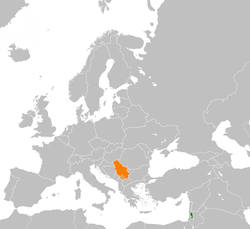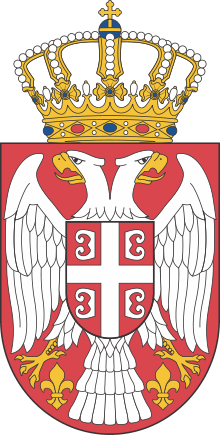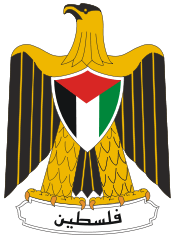Palestine–Serbia relations
 |
|
Palestine |
Serbia |
|---|---|
Palestinian–Serbian relations are foreign relations between the State of Palestine and the Republic of Serbia. Relations between Serbia and Palestine have been very close and friendly. Even though Serbia had reestablished relations with Israel in 1991, its relations with Palestine still remain excellent.
Historical relations
The Socialist Federal Republic of Yugoslavia under Josip Broz Tito had established diplomatic relations with Israel in 1948. After the Six Day War in 1967, the SFRY had cut off all diplomatic relations with Israel and did not restore them until 1991. Tito had strongly supported Yasser Arafat and the Palestine Liberation Organization. Yasser Arafat was one of the dignitaries who had visited Belgrade after the death of Tito on 8 May 1980.[1] Yugoslavia had recognized the State of Palestine on 16 November 1988 and had established full diplomatic relations with it by 1989. During the Yugoslav wars in the 1990s, Palestine had recognised the Federal Republic of Yugoslavia (then Serbia and Montenegro) and all the other former Yugoslav republics.
In late 1999, during a time when Serbia's government was increasingly isolated internationally for its actions in the Yugoslav Wars, the Palestinian Authority invited Serbian President Slobodan Milošević to celebrate Orthodox Christmas in the city of Bethlehem in the West Bank. Israel, meanwhile, threatened to turn President Milošević over to the International Criminal Court if he ever crossed Israeli-controlled borders.[2] In the end, Milošević didn't attend the ceremonies.
Opposition to Kosovo Independence
Palestine is very strongly against the independence of Kosovo. In February 2008, two senior Palestinian officials representing the Mahmoud Abbas West Bank-controlling government, who also are part of the team negotiating with Israel, disagreed on what the Kosovo events implied for Palestine. Yasser Abed Rabbo said, "If things are not going in the direction of continuous and serious negotiations, then we should take the step and announce our independence unilaterally. Kosovo is not better than us. We deserve independence even before Kosovo, and we ask for the backing of the United States and the European Union for our independence". Saeb Erekat responded that the Palestine Liberation Organization had already declared independence in 1988. "Now we need real independence, not a declaration," said Erekat, "We need real independence by ending the occupation. We are not Kosovo. We are under Israeli occupation and for independence we need to acquire independence".[3]
After a July 2009 state visit to Serbia, President Mahmoud Abbas in a meeting with the Serbian President Boris Tadić, when discussing both the situations in the Middle East and Kosovo said, "We are looking for a way to resolve these problems in a peaceful way, by upholding international law. We cannot impose solutions nor can we accept imposed solutions. That is why we must negotiate".[4][5] In September 2011, during the meeting of Foreign Ministers of the Non-Aligned Movement summit in Belgrade, the Palestinian Ambassador to the UN Riyad Mansour said that Palestine was a "typical foreign occupation which cannot be compared to the issue of Kosovo" as confirmed by international law and the UN.[6][7]
In 2014 Palestinian Ambassador to Serbia Muhammad Nabhan said that "Kosovo has always been part of Serbia", that thus unlike Israel in the Palestinian territories, Serbia has "never occupied Kosovo," and that "Arabs have always supported Serbia and still do".[8]
Gaza War and its aftermath
During the 2008-2009 Gaza War, Foreign Minister Vuk Jeremić said "We are joining the voice of the whole world, which condemns the violence in Gaza, and we call for the stopping of missile attacks on Israel and Israeli attacks against the Gaza strip".[9] Ministry of Foreign Affairs issued a statement saying "Ministry of Foreign Affairs of the Republic of Serbia condemns attacks in the Gaza Strip, and calls for calming of military actions in which guiltless civilians are killed. The Republic of Serbia welcomes the decision of the U.N. Security Council and joins in with the rest of the world in condemning the violence in the Middle East. Republic of Serbia is committed to a peaceful resolution of all conflicts, and calls on both sides to stop the attacks which cause a humanitarian catastrophe."[10] President of the National Assembly Slavica Đukić Dejanović accepted a proposal of the Greek Parliament President for a regional conference aimed at ending the escalating violence in the Middle East.[11] After the 31 May 2010 Gaza flotilla raid, the Serbian Ministry of Foreign Affairs condemned the excessive use of force which caused the deaths of innocent civilians. It also endorsed the UN Security Council's call for an immediate and impartial investigation into the incident.[12] On 23 June 2010 at a summit of Balkan countries in Istanbul, Serbia was one of the countries that strongly condemned Israel's attack on the aid flotilla as well as the loss of life. In October 2011, Serbia voted to recognize Palestine as UNESCO's 195th member, against Israel's wishes. Belgrade declared that it would not have opposed a resolution recognizing Palestinian sovereignty, had one come before the UN General Assembly.[13] On the 29th of November, 2012 Serbia followed through with such promises, voting to welcome Palestine as the newest member of the United Nations by voting in favor of United Nations General Assembly resolution 67/19. That resolution made Palestine a non-member observer state just like the Vatican.[14] During the 2014 Israel-Gaza conflict, Serbian Prime Minister Aleksandar Vučić stated that Serbia respects the right of the state of Israel to existence and a peaceful life of its citizens, and expressed hope that the situation will be resolved peacefully and that everyday life will return to normal.[15]
See also
| Wikimedia Commons has media related to Palestine–Serbia relations. |
References
- ↑ http://www.corbisimages.com/Enlargement/42-20428952.html
- ↑ "Palestinian Authority Invites Milosevic to Bethlehem for Christmas". 2 December 1999.
- ↑ Palestinians 'may declare state', BBC, 2008-02-20
- ↑ Tadić, Abbas discuss Kosovo, Middle East, B92, 2009-07-07
- ↑ PM meets with Palestinian leader, B92, 2009-08-07
- ↑ Non-Aligned Summit in Belgrade, Historic Moment for Creation of Independent Palestinian State?, All Voices, 2011-09-06
- ↑ Palestinians expect support from ex-Yugoslav countries, B92, 2011-09-06
- ↑ "Kosova pjesë e Serbisë/ Ambasadori Palestinez: Arabët mbështesin Serbinë dhe asnjëherë pavarësinë e Kosovës". Bota Sot. 7 July 2014.
- ↑ "Jeremić: Srbija poziva na obustavu sukoba u Gazi". Blic.rs. Retrieved 2009-09-19.
- ↑ "Saopstenje Minisarstva Spoljnih Poslova Povo Povodom Situacije U Gazi". Mfa.rs. Retrieved 2009-09-19.
- ↑ "Djukic Dejanovic Razgovarala Sa Ambasadorom Grcke". Mfa.rs. Retrieved 2009-09-19.
- ↑ "Serbia endorses investigation of attack on flotilla carrying aid to Gaza Strip". Government of Serbia. 1 June 2010. Retrieved 2 June 2010.
- ↑ Adar Primor (2012-03-13). "Israel, between Serbia and Kosovo". Haaretz. Retrieved 2012-03-18.
- ↑
- ↑ "Serbia backs Israel's right to peaceful life of its citizens". inSerbia.info. 30 July 2014. Retrieved 31 July 2014.

